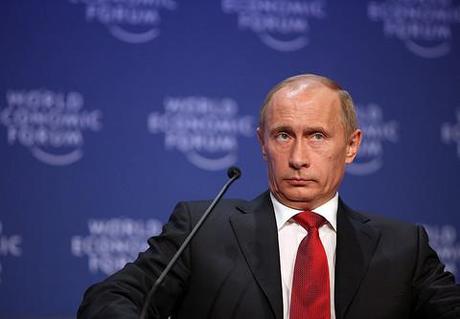
Putin: In decline? Photo credit: World Economic Forum
Anti-Putin protesters took to the streets of Moscow following an election that saw the Russian prime minister’s party return to power amid allegations of serious voting fraud. There were violent clashes between demonstrators and riot police armed with water cannon; two opposition leaders were arrested.
The protests have since died down, reported Miriam Elder in The Guardian, after police and pro-Kremlin youth activists cracked down on a large gathering. But is this really the end, or is anti-Putin feeling strong enough to swell the protests into Russia’s Tahrir Square?
Protests threaten Putin. “The protests are not just a nuisance, but are now seen as a real threat as Putinism begins to collapse under the weight of corruption, an economic slowdown and cultural stagnation”, wrote Daniel Korski on The Spectator’s Coffee House blog. According to Korski, the key point about the current protests is that they are made up of “mainstream” demonstrators, rather than those on the margins of society.
US Senator John McCain sent a Twitter warning to Putin over the protests: “Dear Vlad, The #ArabSpring is coming to a neighborhood near you.”
Damage but no immediate threat. The protests are unlikely to have an immediate effect on Russian domestic politics but they are damaging Putin’s reputation at home and abroad, said a Times (£) editorial. According to The Times, it’s time for Putin to loosen his grip: “Mr Putin has an opportunity to show the world that he can rule Russia not only with a strong fist, but also democratically, with a strong Opposition.”
Importance of the internet. The Times also pointed out that the Kremlin is ill-prepared to deal with the power of the internet, where young Russians can vent their anger more freely. On a similar note, Adam Clark Estes pointed out on The Atlantic Wire that YouTube may provide the best evidence of Russian electoral fraud: “The site is packed with clips that appear to catch officials in the act of everything from changing votes after they’ve been submitted to stuffing ballot boxes, literally.”
The video below apparently shows election officials giving Russian voters erasable-ink pens to fill in their ballots.
Opposition not strong enough. This is not Russia’s Tahrir Square moment because the country’s opposition parties simply aren’t strong enough, wrote David Hearst in The Guardian: “First, liberal parties are notoriously prone to splits; and second, they are just not that popular.” Hearst spoke to liberal MP and professor Vladimir Ryzhkov, who was pessimistic about the chance of change: “According to him 85% of Russians are not involved in any association of any kind, political, social, religious or any other. There is near-complete passivity.”
Putin in decline but still in power. Daniel Treisman focused on the actual election results at CNN, pointing out that while Putin’s United Russia Party won, it has also lost votes: “Official results gave it just short of 50%, down from 64 percent four years ago.” What’s more, Treisman said, Putin has lost personal popularity points in the polls and support for opposition parties was up. His conclusion? “Putin’s regime is unlikely to collapse anytime soon… But the election makes it official: The downward slide has begun.”

